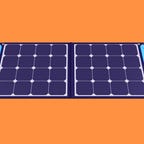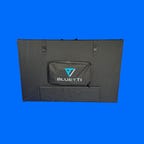Portable power stations let you take power wherever you go. A portable solar panel will let you keep it charged up wherever the sun shines.
CNET's current favorite is the Jackery SolarSaga 200, thanks to its lightweight and sizable solar-charging capacity. If this one doesn't fit your needs or budget, we have plenty of other options.
Portable solar panels (and the portable power stations they're sometimes paired with as solar power generators) mirror trends in rooftop solar panels and solar batteries. A big one is that your options as a consumer are rapidly expanding. Whether you're looking for a solar panel to charge a battery while you're camping off-grid or charge your phone or power some tools, there's likely an option for you. We've got CNET's picks for the best solar panels below and a few others that could still be a good fit for you. We'll also lay out how we made our picks so that you can make the best decision for you.
Jackery SolarSaga 200 (the largest of their SolarSaga series) is my top choice for portable solar panels because it's highly efficient and large enough for plenty of uses. It's also one of the lightest and least expensive for its size. Pair it with the Jackery Explorer 2000 power station, and you get CNET's favorite solar generator.
With a capacity of 200 watts, it's large enough to handle most of your solar-charging needs. Four of these panels can fill Jackery's 1,000-watt-hour power station in 1.8 hours. Like all the panels featured on this list, this one folds up. The folded panel is one-quarter the size of its fully deployed dimensions. The SolarSaga 200 sets the high mark for efficiency among portable solar panels at 24.3%. It also has one of the highest watts-per-pound measures. (A 200-watt solar panel that weighs 30 pounds isn't as useful as one that weighs only 17.6 pounds, like the SolarSaga 200.)
The SolarSaga 200 is a bit more expensive than the other solar panels on the list, including some of the similarly sized ones. It comes with a 3-year warranty that covers manufacturer defects if you buy it from specific retailers.
When paired with Jackery power stations, your purchase of a SolarSaga 200 has plenty of room to grow. Jackery's power stations have some of the highest maximum solar inputs of any power station today. If solar charging quickly is important, you'll be able to build up to it.
Many portable solar panels include bells and whistles to set themselves apart, but there is no substitute for raw power output. The Duracell did just that and excelled under CNET's Testing Lab conditions compared with the competition. The Duracell provided 20% more output than its box specs said it would. For comparison, that's in a market where 10% to 20% less power than what's listed on the box is the norm. For the price, a high-performing product like this is too good to pass up.
The SolarPower ONE from Geneverse is a quality solar panel within reach for many people. With a capacity of 100 watts, the SolarPower ONE comes in at about $3 per watt. That's one of the better marks for panels of this size, though larger panels will typically cost less per watt, albeit more overall. While this model is a bit more expensive than picks we've had in this spot previously, we've seen some of our favorite small, budget panels drop off the market.
SolarPower ONE has an efficiency rating of 23%, which is toward the top of the range of the panels we tested, although some larger panels have higher rates.
This model also packs a lot of power into a relatively light package. At just 9.1 pounds, it's one of the lightest 100-watt models we've tested. That means it'll be easier to take advantage of the portable nature of this panel and take it with you.
It makes sense that a solar panel with a greater charging capacity is likely to weigh more. In general, that holds true. Some solar panels do a better job of capturing more sunlight without adding a ton of extra weight. The best we found at packing charging power into a small package is Oupes with its 100-watt portable solar panel at 8 pounds.
This Oupes has 12.5 watts of solar charging capacity for every pound it weighs. It's lighter than some panels that are only 50 watts. The Oupes 100-watt portable solar panel has a respectable, although not top-of-the-line, 20% efficiency rating. It's also cheaper than most other panels of similar sizes. (It's part of my pick for the best value solar generator, the Oupes 600-watt solar generator kit.)
If you need fast solar charging on the go, there's one panel that stands out above the rest. Bluetti's PV350 portable solar panel has a massive solar capacity of 350 watts, so it can collect more sunlight and send more electricity to your devices. It's 75% larger than my best overall pick, the Jackery SolarSaga 200. Besides being big, the PV350 also has an excellent efficiency rating of 23.4%. While heavier than any other panel we considered (30.69 pounds), on a pound-per-watt basis, it's actually one of the lighter options.
As you might expect, the PV350 will set you back more than other panels. For what you're getting, it's a fair price. For every dollar you spend, you're buying 0.41-watt of charging capacity. That tops our value pick above, but the Oupes seemed more within reach and a better fit for more uses.
Other portable solar panels we tested
Biolite Solar Panel 100: The Solar Panel 100 is the first larger offering from Biolite, which produced smaller 5- and 10-watt solar panels for a little while. Its 100-watt offering is pretty much in line with the other options here, but without discounts, it's a little more expensive to start than others.
Bluetti PV200: This 200-watt model from Bluetti could have been the choice for the best all-around portable solar panel, instead of the Jackery SolarSaga 200. It's light for its size and cheaper per watt than the Jackery. It has an efficiency rating of 23.4%.
Anker 625: This 100-watt panel has an efficiency rating of 23% and weighs 11 pounds. It's a little heavier and more expensive per watt than some others on this list, especially of the same size.
EcoFlow 110-Watt Solar Panel: The EcoFlow 110-watt panel matches our lightweight pick at 12.5 watts per pound. It's a little more expensive for its size than others, but has a good efficiency rating and great, compatible power stations.
Goal Zero Nomad 50: This bite-size solar panel has the smallest capacity of any on this list. It's a good panel, but you can get just a bit more capacity for less money in a few other places.
Renogy Voyager: The 100-watt solar panel from Renogy is a really good price for its size. It's also a lot heavier compared to panels that are its size and larger.
How to choose the best portable solar panel
Finding the best portable solar panel for you really comes down to choosing the one that fits your needs and budget. Here are some things you might consider when looking for the best panels.
Price
Price generally trends with size: The larger the panel, the more expensive. If you're struggling to compare prices across different sizes, quickly calculate the cost per watt of the panels you're considering by dividing the price by the panel's wattage rating. For example, you can get the 200-watt Jackery SolarSaga 200 for $699, or $3.50 per watt. Or, you can get the 350-watt Bluetti PV350 for $677 (when discounted), or $1.93 per watt.
Size
The panels we tested for this list ranged from 50 watts to 350 watts. A larger panel will charge compatible devices faster, but will also take up more space, likely weigh more and cost more (though not always). You can calculate a standardized measurement for weight similar to the cost per watt above. Instead of the price, divide the weight by the wattage rating. For example, the Jackery SolarSaga 200 weighs 17.6 pounds, which means it weighs .088 pounds per watt. Bluetti's PV350 weighs .087 pounds per watt.
Compatibility
If you have your eye on a portable power station from a specific brand, you'll want to make sure your chosen panel is compatible. (Most companies that offer both also offer them as a package.) You might also want to check to see if you can daisy-chain multiple solar panels together before deciding, especially if you think your solar charging needs are going to increase in the future.
Use
What you plan to use your portable solar panel for is probably the most important consideration. Are you going to charge a portable power station with a capacity of 250 watt-hours or 2 kilowatt-hours? Do you want to carry it with you over considerable distances or just from the car to your campsite?
Read more: Just looking for an emergency backup? Check out solar batteries and solar generators.
How we test portable solar panels
Because of difficulties in getting accurate data in the lab, our ranking of portable solar panels relies more on research and comparison of each panel's specs than an actual testing protocol. Where specs were not publicly available, we reached out to companies to get them. Then we compared them, finding ways to make comparisons across different sizes of solar panels. The watt-per-pound and watt-per-dollar measures were two ways we did that.
CNET editors also had hands-on experience with these solar panels, so we could notice anything out of the ordinary or poorly made.
Portable solar panel FAQs
What is a watt when it comes to solar panel size?
If you've only come across the measurement watts in one place, it was probably lightbulbs. With lightbulbs, it measures how much energy the bulb uses to light up. A 60-watt lightbulb uses 60 watts to turn on. Since solar panels don't consume but produce energy, the measure here is how much they can produce. A 100-watt solar panel, when it's operating at full capacity, can produce 100 watts of electricity at a time.
If you're charging a 300-watt-hour battery with a 100-watt solar panel, you might expect it to take 3 hours to fully charge it, because 100 watts of electricity generation times 3 hours equals 300 watt hours. It's a bit more complicated because charging the last portion of a battery (such as a portable battery power station) often takes much longer than the first part.
Why isn't my solar panel charging as much as it's supposed to?
You bought a 100-watt solar panel and plugged it into your power station, which tells you how much power is flowing in. Instead of 100 watts, your power station says 80 or 50 or something else. Is your panel broken?
While I can't rule out that your panel is broken, solar charging increases and decreases for a lot of reasons that shouldn't have you sending your panel back to the manufacturer.
Since solar panels convert sunlight to electricity, how much sun gets to your panel has a direct effect on its production. Besides the obvious factors like clouds or shade, the angle of the sun or the angle of the panel to the sun could have an effect. You could try tipping your panel to face the sun more directly.
Solar panels don't work as efficiently when they're hot. If it's a scorcher, you might see a decrease in electricity generation. If you're using your panels in dusty spots, like a campsite, washing away any dust that settles on them could increase their production, too.
How fast will a portable solar panel charge my device?
The answer to this question relies on factors on both sides of the equation: the solar panel and the device.
How much energy your solar panel produces depends directly on the sun available. A solar panel will charge a device more slowly on partly cloudy days than on clear ones. A dirty solar panel will charge devices more slowly for the same reason. Anything that gets between the panel and the sun means less power for your phone.
A larger solar panel that can collect more sunlight could charge devices more quickly: A 200-watt solar panel can generate twice the power of a 100-watt solar panel. It's not all up to the panel, though.
Charging speed can also be limited by your device. Solar generators, for example, have a maximum solar input allowable. Under the same conditions, a solar generator limited to a single 100-watt solar panel won't charge as fast as one that can connect to four 100-watt solar panels. Further, if your device supports fast charging it will outpace one that doesn't.
Our Experts

CNET staff -- not advertisers, partners or business interests -- determine how we review the products and services we cover. If you buy through our links, we may get paid.
Reviews ethics statement
Katie Collins Managing Editor
Katie Collins is a managing editor for CNET overseeing coverage for home energy, utilities, renewable energy, solar energy, climate issues, electric vehicles, plug-in hybrids, EV charging infrastructure, energy deregulation, home electrification, personal finance, mortgages, home equity, banking, savings, credit building, credit cards, taxes, identity theft, retirement, and investing. Katie recently visited CNET's Testing Lab in Louisville, KY to oversee its testing of rooftop solar panels, portable solar panels, portable power stations, EV chargers, generators, and home battery solutions. Prior to CNET, Katie's editorial experience was under TIME's former personal finance brand, NextAdvisor, as well as The Simple Dollar, Reviews.com, Interest.com and CreditCards.com. Katie holds a bachelor's degree deviant behavior and social control from CUNY John Jay College of Criminal Justice and spent a decade working with at-risk teenagers and facilitating family crisis intervention and anger management groups. Katie took her counseling skills and passion for helping people into service journalism. Her goal is to help people make important decisions and reach their personal life goals. Katie's free time is spent with her two human children and two fur children. You can reach me at kcollins@cnet.com
Expertise Energy, Solar Power, Renewable Energy, Climate Issues, Electric Vehicles, Plug-in Hybrids, EV Charging Infrastructure, Home Electrification, Deregulated Energy, Personal Finance, Mortgages, Home Equity, Housing Market, Loans, Banking, Taxes, Credit Cards,
We thoroughly evaluate each company and product we review and ensure our stories meet our high editorial standards.

Instantly estimate your solar cost and savings. Pick a provider later.
...



